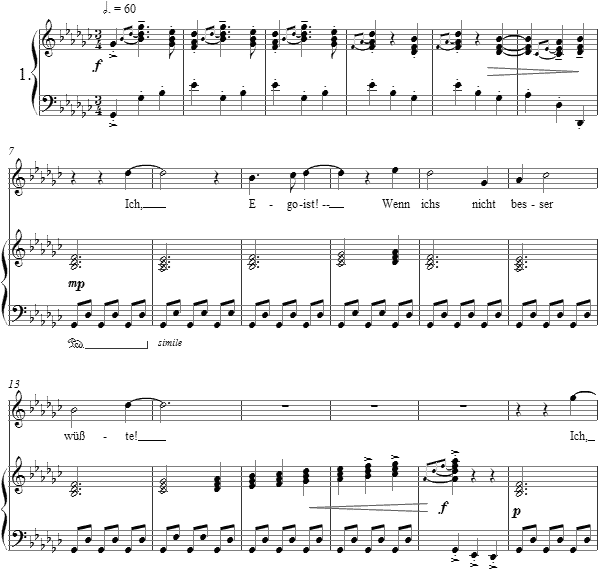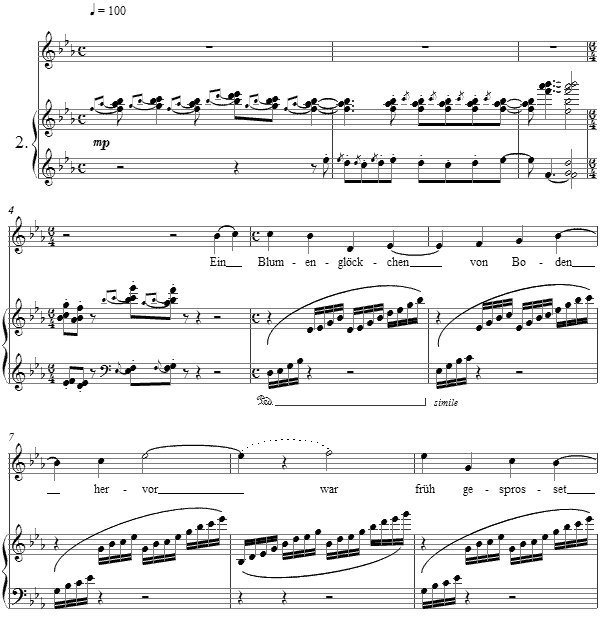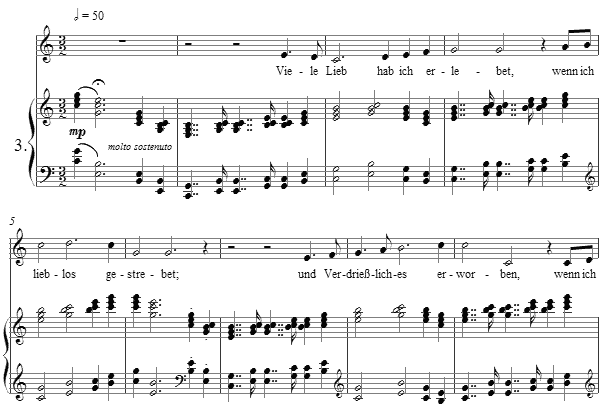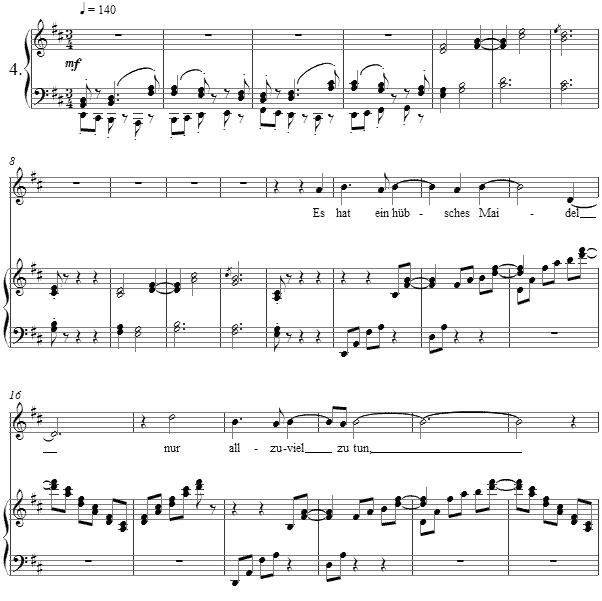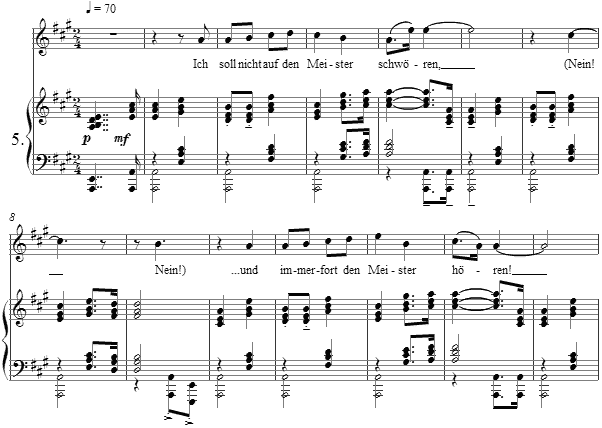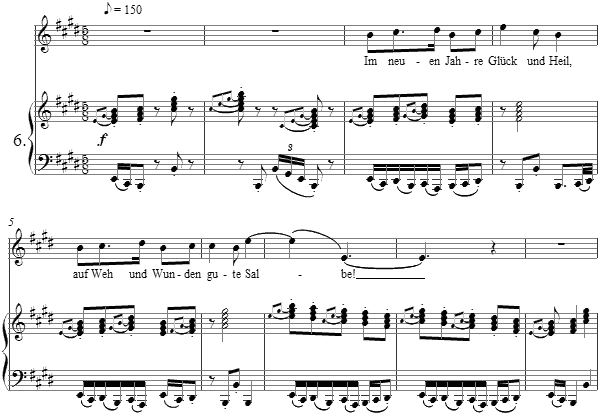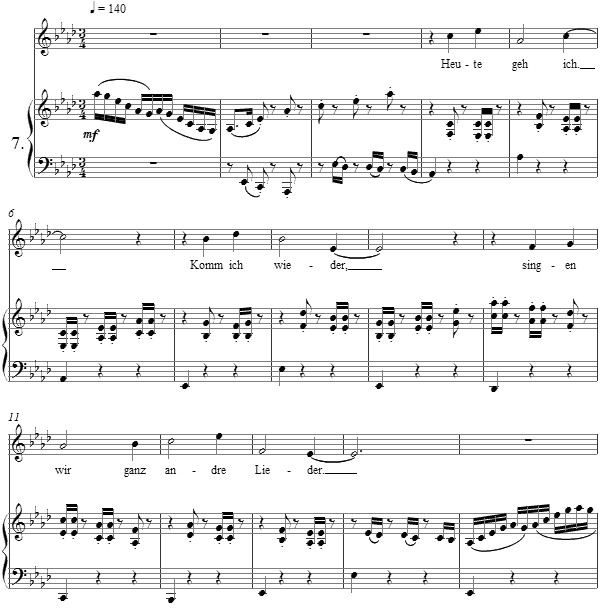Music and Texts of GARY BACHLUND
Vocal Music | Piano | Organ | Chamber Music | Orchestral | Articles and Commentary | Poems and Stories | Miscellany | FAQs
Sieben Goethe-liederchen - (2009)
Johann Wolfgang Goethe
for soprano and piano
Barbara Krieger gewidmet
i. Ich, Egoist! - [ 3 pages, circa 1' 10" ]
Ich, Egoist! -- Wenn ichs nicht besser wüßte!
Der Neid, das ist der Egoiste;
Und was ich auch für Wege geloffen,
Aufm Neidpfad habt ihr mich nie betroffen.
ii. Gleich und Gleich - [ 2 pages, circa 1' 05"]
Ein Blumenglöckchen
Vom Boden hervor
War früh gesprosset
In lieblichem Flor;
Da kam ein Bienchen
Und naschte fein: -
Die müssen wohl beide
Für einander sein.
iii. Der Saldo - [ 1 page, circa 1' 15" ]
Viele Lieb hab ich erlebet,
Wenn ich lieblos gestrebet;
Und Verdrießliches erworben,
Wenn ich fast für Lieb gestorben.
So du es zusammengezogen,
Bleibet Saldo dir gewogen.
iv. Der Rausch - [ 2 pages, circa 1' 10" ]
Es hat ein hübsches Maidel
Nur allzuviel zu tun,
Der Bursche trinkt manch Seidel
Und kann hernach nicht ruhn.
Und wenn sie dann sich trafen,
Wer kann was dafür?
Er hat den Rausch verschlafen,
Der Rausch, er schläft mit ihr.
v. Nein - [ 1 page, circa 55" ]
Ich soll nicht auf den Meister schwören,
Und immerfort den Meister hören!
Nein, ich weiß, er kann nicht lügen,
Will mich gern mit ihm betrügen.
vi. Im neuen Jahr - [ 1 page, circa 40" ]
Im neuen Jahre Glück und Heil!
Auf Weh und Wunden gute Salbe!
Auf groben Klotz ein grober Keil!
Auf einen Schelmen anderthalbe!
vii. Der Abschied - [ 3 pages, circa 1' 20" ]
Heute geh ich. Komm ich wieder,
Singen wir ganz andre Lieder.
Wo so viel sich hoffen läßt,
Ist der Abschied ja ein Fest.[ 13 pages, circa 7' 35" ]
Johann Wolfgang Goethe
The texts are drawn from Goethe's considerable number of smaller poems and epigrams from his Weimar period, charming in their various takes on life. Unlike another set of seven, more rude texts which I set twenty year ago -- Goethe-lieder -- these often are tongue-in-cheek, while at the same time a little fresh. One should remember Goethe's admonition that we all as artists are the sum of what we do, and not merely represented by a small portion or perhaps the most popular, but all.
i. Me! Egoist!
Me! Egoist! -- When I know no better!
Envy? That is the egoist;
And when I am also on this path,
On the ego-avenue I have met no one else.
The setting is jaunty, in a triple meter "one" and in a standard A-B-A form.
ii. Two Equals
A little campanula
Had from its soil
Sprung up early
Into a lovely display;
There came a little bee
Which supped sweetly:
They must have been
Made for each other.
In a bright 4/4 meter, the accompaniment lingers on various arpeggios of the tonic with its major seventh or sixth included.
iii. Account Balance
I have felt much love,
When I reached out loveless;
And much irritation earned,
When I almost died for love.
So is it always seemingly this way,
That things tend to balance themselves out.
The somewhat lower tessitura of this setting suggests a more serious tone, as the accompaniment mostly is a succession of inversions of the tonic major seven, harmonically static and made into large arches through transpositions.
iv. Snoring
There was a charming gal
with all too much to do,
Whose lad drunk far to often
And for this did not rest well.
And when she was with him,
What did happen?
He slept snoring through the night,
And that snore, it slept with her.
If Saldo precedes this, then one might ask wherein lies the "balance" for our young lady? A set of disparate gestures paint different musical images so as to hint at characters in this tiny drama. Or is it a comedy?
v. No
I shall not swear by the expert,
And yet always pay attention to him.
No, I know, he cannot so much lie,
As be tricked easily by me.
A rhapsodic yet small setting filled with pseudo-importance and self-importance as the truth of lie which Goethe reminds us centers on experts who are so often proven to be inexpert.
vi. In the New Year
In the new year, fortune and health!
For grief and pain a decent cure!
From coarse oafs some effective distance!
And one and a half times that from a rogue!
The meter is drawn from one possible rhythmic reading of the first line, extended across the setting. Goethe shows us a pleasant first face, and then a more acerbic side as he wishes a new year filled with "distance" from fools. A fine wish, with which I agree.
vii. Parting
Today I go. Then I return,
As we sing complete other songs.
Where we place hope so greatly,
Is the parting, yes a celebration.
A small song form in waltz time, which opens with a gesture seemingly pointing towards a 3/8 meter. The melody line rises to the highest point of its range as the final "parting" of this set of seven small Goethe song settings.
Soprano Barbara Krieger has performed with the Wiener Staatsoper, Oper Leipzig, the Easter Festival of Salzburg, the Gran Teatre del Liceu in Barcelona and the operas of Tokyo and Osaka, after a success in AS.LI.CO competition sponsored by the La Scala di Milano in 1997. She has studied German and English philology, and musicology at the University of Mainz, and at the Opera School at Wiesbaden with a scholarship from the »Richard Wagner Society« of Wiesbaden, and vocal studies with Rudolf Knoll at the University of Music, Theatre and Visual Arts »Mozarteum« in Salzburg in 1992.
The score for Sieben Goethe-liederchen is available as a free PDF download, though any major commercial performance or recording of the work is prohibited without prior arrangement with the composer. Click on the graphic below for this piano-vocal score.

